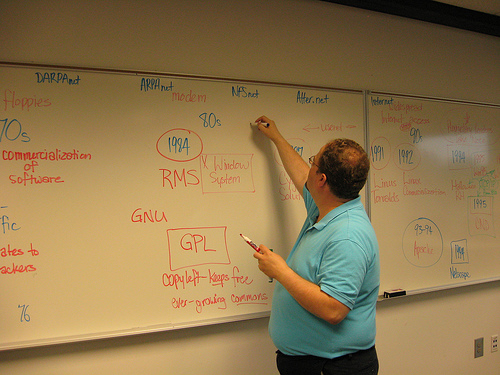POSSE Monday: this history of OSS
The day continued with a history lesson.

Most of it is contained in this hastily stitched-together image - click to enlarge.
Notes below mostly courtesy of Ian Weller.
Back in the 60's and 70's, what was code like? Pretty much married to hardware and very task-specific. Folks would swap tapes; it was all open and you could contribute back.
Then came the 70's and just as software became hardware-independent.
RMS gets fed up in 1984, starts the GNU project, creates the GPL. It uses copyright law (and contract law) to create a new ever-growing commons and led to the creative commons movement and others.
IETF process for interoperability starts in 1986. (Also in 1986: Mel is born.)
1991: linus torvalds. not real professional like good ol' minix, only runs on i386. (Also in 1991: Ian is born.)
Moving into the future. Now we're writing modes of communication on the white board. tapes -> floppies -> modem -> unrestricted
internet access -> ??? -> profit!! http, usenet... from a software development/distribution point of view, access to USENET and FTP was big. in other words -- the internet evolved quite a bit between GPL and Linux.
NCSA had a web server with a slow release cycle, and so everyone who wrote patches for this server (because it wouldn't work) came together and created something called "apache."
Why minix didn't take off instead of linux: licensing issue.
OSS isn't about everyone loving each other and their code, there are schisms (i.e., BSD). You have that now, i.e., webkit vs gecko; packaging systems, rpm vs deb vs whatever else.
We're at the 90s now. residential internet --> growth of web.
1987 -- first ever company to commercialize free software. Unless you count IBM. Caldera put together red hat and novell stuff and sold it, we have commercialization of free software after the halloween release of RH Linux.
Mosiac Communications Corporation, 4/4/1994.
1994/1995ish: proprietary vendors start to notice.
win95 -> pulls BSD tcp/ip stack
TCP/IP from BSD happening around '95-'98...
1998 is the first time we see a large commercial codebase (Mozilla) being converted to an OSS license.
windows 2000 is "mainstream." the concept of open source is... not really out there. Mindset: "have you heard of firefox?" "yeah. it's free, but so is internet explorer, so what's the diff?"
Regarding Sun open-sourcing Java: open source tends to follow open standards, and open standards tend to create open source, and Java is an open standard.
2004: XFree86 --> X.org.
2005: ajax takes off.
And on into the future...
Ian and Mel later gave a short overview of what this history looked like from our perspective - we were growing up while most of this was going on (largely unbeknownst to us).

